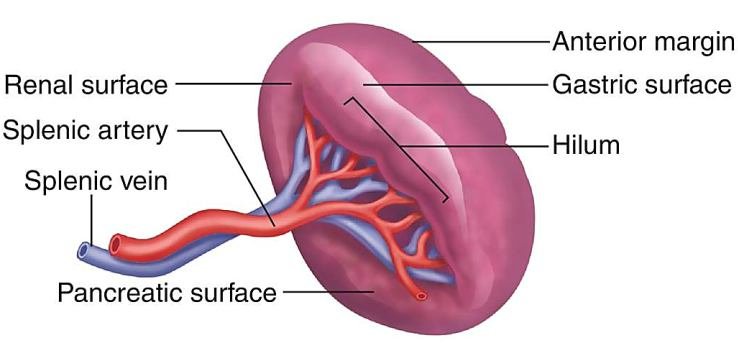Functions
- Blood Filtration
- The spleen acts as a blood filter, removing old and damaged red blood cells from circulation. This process helps maintain healthy blood cell levels and prevents the buildup of cellular debris.
- Immune Response
- The spleen is a key player in the immune system. It produces white blood cells, particularly lymphocytes, which are vital for fighting infections. The spleen also acts as a reservoir for blood, releasing it during times of need, such as during hemorrhage.
- Iron Recycling
- By breaking down old red blood cells, the spleen recycles iron, which is essential for the production of new red blood cells. This recycling process helps maintain proper iron levels in the body.
- Platelet Storage
- The spleen stores platelets, which are crucial for blood clotting. During injury or trauma, the spleen releases these platelets to help form clots and prevent excessive bleeding.
Importance
The spleen’s multifaceted role in blood filtration, immune response, iron recycling, and platelet storage underscores its importance in overall health. Despite its relatively small size, the spleen’s contributions are vital for maintaining homeostasis and responding to infections and injuries.
Common Related Health Issues
- Splenomegaly (Enlarged Spleen)
- Splenomegaly is a condition where the spleen becomes enlarged, often due to infections, liver diseases, or blood disorders. Symptoms may include pain or fullness in the left upper abdomen, fatigue, and anemia. Treatment depends on the underlying cause and may involve medications or, in severe cases, surgery.
- Spleen Rupture
- A ruptured spleen is a medical emergency typically caused by trauma to the abdomen. Symptoms include severe pain, dizziness, and low blood pressure. Immediate medical attention is crucial, and treatment may involve surgical repair or removal of the spleen.
- Hypersplenism
- Hypersplenism is a condition where the spleen is overactive, leading to the excessive destruction of blood cells. This can result in anemia, leukopenia (low white blood cell count), and thrombocytopenia (low platelet count). Management includes treating the underlying cause and, in some cases, partial or complete removal of the spleen.
- Infections and Inflammation
- It can be affected by various infections and inflammatory conditions, including bacterial, viral, and parasitic infections. These conditions can impair spleen function and lead to symptoms such as fever, pain, and fatigue. Treatment involves addressing the specific infection or inflammatory cause.
Living Without
While it plays a critical role in health, it is possible to live without it. When is removed, other organs, such as the liver, take over some of its functions. However, individuals without more susceptible to infections and may require vaccinations and prophylactic antibiotics to prevent illness.
Conclusion
The spleen is a small but mighty organ essential for blood filtration, immune response, iron recycling, and platelet storage. Understanding its functions and potential health issues can help individuals maintain their overall well-being and seek timely medical attention when needed.
FAQ
Q1: Where is the located in the body?
- The is located in the upper left part of the abdomen, beneath the rib cage.
Q2: What are the main functions?
- The functions primarily in blood filtration, immune response, iron recycling, and platelet storage.
Q3: What causes an enlarged (splenomegaly)?
- Splenomegaly can be caused by infections, liver diseases, blood disorders, or certain cancers.
Q4: What are the symptoms of an enlarged ?
- Symptoms may include pain or fullness in the left upper abdomen, fatigue, and anemia.
Q5: Can a rupture?
- Yes, rupture can occur due to trauma to the abdomen, leading to severe pain, dizziness, and low blood pressure.


